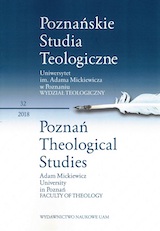Aurora Jakuba Böhme w świetle czterech zasad reformacji
Aurora’s Jakub Böhme in light of the four principles of the Reformation
Author(s): Bogdan FerdekSubject(s): Christian Theology and Religion, Philosophy of Religion, Evaluation research, 17th Century, Biblical studies
Published by: Uniwersytet Adama Mickiewicza
Keywords: mysticism; priciples of the Reformation; christology; theosophist;
Summary/Abstract: Böhm’s mysticism aroused the opposition of orthodox Lutheranism. Evangelical parish priest of the Peter and Paul church in Görlitz Gregorius Richter suspect a heresy in Aurora and threatened Böhm with banishment. Numerous Aurora texts indicate that Böhme took into account the four principles of the Reformation. Böhm’s Aurora contains the reformational principle the grace itself and the anthropology implied by it, about the non-free will of human being. While in Luther thoughts were dominated by the functional Christology, in the Böhme’s – essential Christology. The essence of this Christology is to call Christ Aurora. From the essential Christology, Böhme, however, derived a functional conclusion, which is the postulate of the following Christ.
Journal: Poznańskie Studia Teologiczne
- Issue Year: 32/2018
- Issue No: 1
- Page Range: 141-150
- Page Count: 10
- Language: Polish

